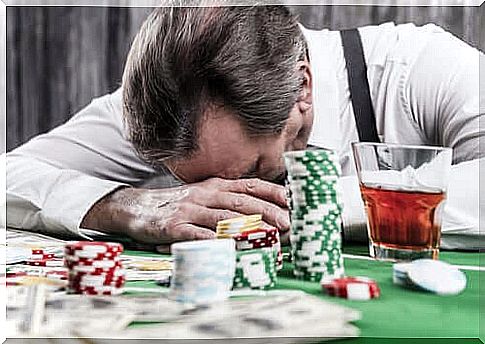Cognitive Distortions Of The Pathological Player

Player cognitive distortions are very common distorted cognitive phenomena. When we talk about mental disorders such as pathological gambling, they acquire even more importance, as in many cases they are the cause or are among the factors that feed it.
Gambling is one of the oldest activities in the world. In the history of mankind you can find the names of famous characters obsessed with the game. Emperor Claudius, Dostoevsky or Don Juan Casanova are just a few examples.
When we talk about pathological gambling, we refer to gambling. Video games, therefore, do not fall into this category, although this does not exclude that they cause the same levels of addiction.
According to the diagnostic manuals, pathological gambling is characterized by the loss of control over the game itself and the onset of an addictive relationship. The subject continues to play even though he is aware of the negative consequences.
Pathological gambling has gone from being classified as an impulse control disorder to being included in the addictive disorder group in the DSM-5, as it shares several characteristics with them.

Cognitive distortions of the player
Pathological gamblers harbor certain irrational beliefs or cognitive distortions in their minds that push them to continue their gambling addiction.
Player cognitive distortions are anomalies that occur during information processing. They are not necessarily pathological, since everyone – some more or less – suffer from them, but it is nevertheless advisable to intervene when they become too frequent and prevent us from moving forward. The cognitive distortions typical of pathological players are the following:
- Illusion of being in control. It is the belief that the results of the game depend more on one’s actions than on destiny. The person really thinks he is able to control the matches and his results himself. For example, a pathological player may say to himself: “I have a surefire way to win.” He comes to convince himself of this distortion, which obviously leads him to continue playing.
- Fix on absolute combinations. The person measures success in the game by focusing solely on the victories obtained, without taking into account the losses. Usually, the pathological gambler loses far more than he wins, but this distortion protects him from reality and keeps him anchored in addiction.
Other distortions typical of the pathological player:
- Superstitions or illusory correlation. They are accidental associations between a certain event or conduct and a prize, in such a way that the player comes to believe that the aforementioned event increases the probability of winning. It can be compared to the habit of wearing an amulet or performing a certain ritual. Evidently this is a magical thought, since we know that the pathological player cannot control victory or loss with his actions. An example of this cognitive distortion would be: “If I shoot the data while I am facing my back, I will get a higher score”.
- Personification of the machine. Some pathological players attribute animated characteristics to the machines or objects they usually play with. They might say to themselves, “The machine is deceiving me, it wants to confuse me, but it won’t. I have everything under control.
How to overcome one’s cognitive distortions?
The first step is to make the pathological player aware of the anomaly. Cognitive distortions are not easy to spot because over time they become automatic. One way to identify them is to ask the ludopath patient to fill in a personal register whenever he feels the urge to play. If explained adequately and if the patient fills it in correctly, he will become aware of the cognitive distortions with which he usually acts.
Thanks to this, we will be able to show him which are the most common distortions committed by individuals with gambling addiction and ask him which (or which) he most identifies with. Once this is done, it is necessary for the patient to understand that these cognitive distortions are mainly fueled by his addiction to gambling.

Make changes to improve the situation
To change these distortions, it is important to question them and intervene through thoughts based on objectivity and reality.
This is possible through Socratic questioning and guided discovery. That is, the patient wonders what demonstrations or what evidence he has to support that thought he continues to have. “Why am I so sure my method is foolproof? Does it really depend on whether I win or lose? What is the proof? ”.
Following the Socratic dialogue with himself and after falling into these errors of distortion, the person will be more willing to change his way of thinking.
To succeed, however, he will have to review all the questions he has asked himself and prepare a rational answer, which from now on will be his mental mantra. For example: “I don’t have control over the machine running on a case-by-case basis”, “I have won a few times, but the data proves that I have lost even more. There is no fulfillment ”.
By practicing, the player will realize, little by little, the uselessness of his behavior and the fact that his problem generates only new problems: economic, family or work. In doing so, the person is expected to end up losing interest and quit the game.









